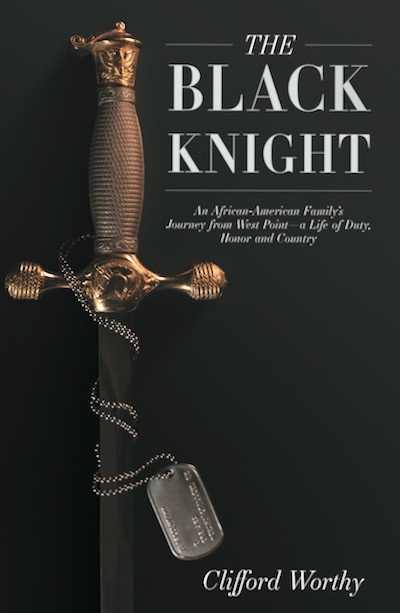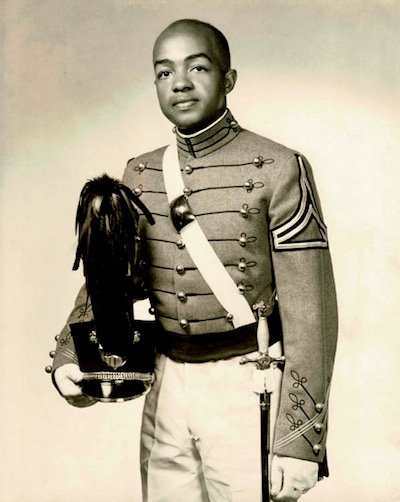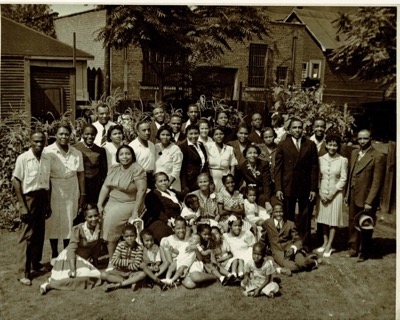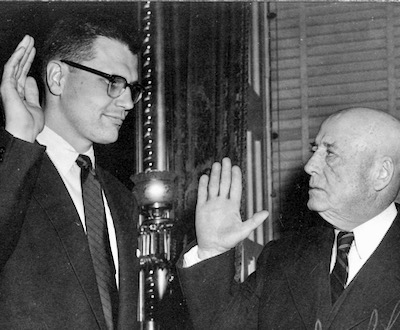Care to Learn More about This Book? You can find The Black Knight right now on Amazon or Barnes & Noble. You’ll also find much more information at www.TheBlackKnightBook.com. And, you can directly order from our publishing house here.
By DAVID CRUMM
Editor of ReadTheSpirit magazine
When I first met retired Col. Clifford Worthy, his firm handshake and straight-backed military bearing commanded respect. I could not believe he was 89, as he began to vigorously tell his life story and unfold a thick photo album from his adventures around the world.
The press release about his new memoir, The Black Knight, begins this way:
Clifford Worthy, the great grandson of slaves, was one of the few African-American men of his generation who was accepted and excelled as a Black Knight of the Hudson, a traditional nickname for West Point cadets. Worthy describes his journey to West Point, the many challenges he overcame both in his family and in the U.S. Army, including service in the front lines of Vietnam.
Rick Forzano, former head coach of the Detroit Lions, praises Worthy’s memoir and his example to all of us. “He has fought his way through virtually every stage in life with his faith in God giving him the necessary strength and courage,” Forzano writes.
As Col. Worthy and I talked in that first meeting, I was impressed with the title he had chosen for his book. He is literally a Black Knight of the Hudson—a proud West Point alum. Then, of course, there is deeper meaning to the word “Black” in the title. His memoir vividly shows us what it was like to be among those early African-American cadets who emerged after President Harry Truman officially integrated the Army.
What I came to realize—in the year we worked together on editing his manuscript—is that the most powerfully evocative word in the book’s title actually is “Knight.” In a lifetime of journalism, I’ve covered knights and knighthood in a host of contexts around the world—from those who have received royal European honors to the host of knights in popular culture. But I had never met someone who more fully embodied the concept—until I met Col. Worthy.
The artist who designed the book’s cover, Ann Arbor-based Becky Hile, had the same instinctive response when she met Col. Worthy at his home. On that day, Becky had arranged for a series of high-resolution photographs to be taken of Col. Worthy and the memorabilia in his home. Among all of those visual options, Becky realized that the hilt of Col. Worthy’s West Point saber was the perfect image for the book’s front cover.
Certainly, this is an inspiring book to read for its revelations about military history and Black history. This is the story of one African-American family’s progress through the dangerous years of the Jim Crow South and the decades of civil rights progress that finally opened new doors. This book also carries us through life in the military from the post-World War II era into the Cold War and on to Vietnam.
But the real surprise readers will discover in these pages is the story of this “Knight.” Readers will want to keep turning these pages for story after story of Col. Worthy’s many challenges in trying to be a good husband, father and Christian—as well as a dutiful officer in the U.S. Army. As readers complete this memoir, they’re likely to look at that book cover once again—and recognize both the cross shape and a potent symbol of the centuries-long tradition of noble virtue in a classic knight’s quest.
From Firing Big Guns—to the Loving Challenges of Home
There are plenty of military stories in this book, covering everything from the ferocious power of the big guns Col. Worthy would command on the battlefield—to the Cold War anxieties of serving toe-to-toe with Communist forces across the Iron Curtain. Veterans and those who love military memoirs will enjoy these aspects of the narrative.
But, there’s so much more here! Some of the most touching stories in this memoir are about the challenges of family life—for a military family, for an African-American family and ultimately for a family with a special-needs son.
Just imagine the challenge this young couple faced in trying to raise a special-needs son in an era when medical professionals were cruelly dismissive of the potential of such children! Col. Worthy and his wife had faith that their son could lead a remarkable life, even in the face of these dire medical verdicts. In the end, they were right in their assessment. The value of their son’s life shines through these pages like a beacon.
Col. Worthy encourages readers, over and over again, to remember the wealth of love and support we can find in our families and networks of friends. He is using his life story to urge all of us to reach out in selfless ways, as he has done.
A Rare Window into African-American Family Life
Want a feel for this narrative? Here are the opening lines of Chapter 1—Walking through the Door:
I am not the product of privilege, but I am from solid stock. The values flowing through my ancestral bloodstream are biblically based and, most likely, you will find they are values that flow through your family as well. I was taught that the road to fulfillment in life is paved by the relentless pursuit of excellence and steadfast trust that God will guide us. As you read my story, however, you will also see that opportunities are sometimes thrust upon us unexpectedly. A successful life depends as much on recognizing and embracing important opportunities as it does on our tireless commitment to a chosen course. Sometimes, despite the plans laid out in front of us, our lives take twists and turns that we never could have imagined. If we are open to change, we can allow Providence to guide us.
In the late 1940s, West Point was virtually out of reach for young men of color. In that era, many colleges and universities had racial barriers and offered few options for poor students, whatever their race. But, in those years, America was changing in surprising ways. A new racial openness at West Point was triggered by direct presidential action. I benefitted from crossing paths at just the right time with Congressional Representative John Dingell Sr., who was committed to knocking down unjust barriers wherever he could.
There is that central theme: Wherever our adventures carry us in life—and whatever dire challenges we face—we can draw on the strength of faith, family and friends.
Dingell: ‘We are servants. We are not masters of people.’
In his Foreword to this book, retired U.S. Rep. John Dingell Jr. writes:
This memoir of retired Col. Cliff Worthy may seem like the story of one family, but it really is the story of many American families. Cliff’s story reminds all of us that—at our best as Americans—we are called to help each other build a stronger, healthier community. America’s great strength is that we come together here—we come together in all of our wonderful diversity, reflecting our families’ origins in places around the world.
Like Col. Worthy, Dingell Jr. relied on the pillars of family and friends. After Dingell Sr. served in Congress under President Roosevelt’s New Deal Era and was able to send Col. Worthy to West Point—Dingell Sr. passed away while in office. At that point, Dingell Jr. followed in his father’s political footsteps and eventually became the longest-serving member of Congress. In his Foreword, Dingell Jr. writes:
My father, John Dingell Sr.—who played a crucial role in the life of the Worthy family—was a wonderful teacher to all of us. He taught me what it meant to truly be a public servant. As I followed him into Congress, I never forgot what he said: “We are servants. We are not masters of people. We serve—and that is the highest calling of all.” …
Today, as Cliff and I both are in our 90s and have retired from public service, we share our pride in family. We can see those around us continuing in this courageous vocation of service. We need to keep opening doors for other families. If my father had not taken that chance in the 1940s of sending a young African-American student from Detroit to West Point—Cliff would not have had his remarkable career. And, as you will read in this memoir, without Cliff’s life of service, I doubt that we would have his daughter, Kym Worthy, serving as our Wayne County Prosecutor today.
As it was in the past, our country once again is deeply divided. I love this country. Cliff Worthy loves this country. I hope that this memoir will remind you of what it truly means to be an American.
We come together. We serve.
Care to Read More?
You can find The Black Knight right now on Amazon or Barnes & Noble. You’ll also find much more information at www.TheBlackKnightBook.com.




